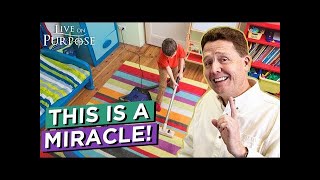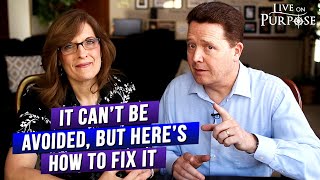Even with our best efforts, sometimes we do it. We lose our cool and yell at our kids. How do you apologize to your child for yelling? We can learn something from our kids. You know when your kids are kind of conflicted with each other and they end up hurting each other they end up yelling or whatever it is. And you tell them, “Okay now, tell your brother you're sorry.” And it doesn’t sound sincere at all. Nobody is convinced. Well, let's learn something from that. Be authentic. Be real about this. I don't want you to pretend to apologize to your child or do it with some strings attached.
For example, what if I were to say, “I'm sorry that I yelled at you. But you shouldn't have…” You are not really sorry at that point. I gave the apology, then I threw the other party under the bus trying to blame them for my misbehavior in the first place. Don't do this with your kids. To a kid it would sound like, “Okay, I shouldn't have yelled at you but you need to listen to me.” What's wrong with that? Right. It's not going to sound authentic to them. So, stay in front of your “but.” “I'm really sorry that I yelled at you,” stop it right there, don't continue.
Go back to the motivation of why you are even apologizing? Do you feel bad about what happened? Ask yourself what needs to happen next to repair the relationship or help them know that you make mistakes, that you are sorry and wish you would have done it differently. So, if you kind of ask that, then it makes it easier to come into the apology with real intent.
The last message you want to send to your kids is that you're fake. Because they're going to extrapolate that and apply it to other things that you tell them. They won't trust you, they won't believe you. As human beings, we are expert at reading other people's emotions. We learn it as a baby. If you think you are hiding the emotion, you are probably not. Go ahead and get authentic so you can present yourself as authentic. Now, this might mean that you back off from things for a little bit. Give yourself a chance to calm some of that emotional flooding that happens when we end up yelling in the first place. My number one view on Live On Purpose TV is “How to get children to listen without yelling?” That implies, “I'm tired of yelling.” Click on the link below to watch the video.
Acknowledge that what you did was wrong. Don’t try to justify it by what happened just before you yelled. Alright? You're acknowledging, “I did that.” And you can make it a totally separate issue. Because you still need to implement appropriate consequences for whatever it was that happened.
A lot of parents get really worried that apologizing might portray them as weak or make them lose their authority. I think it's just the opposite because we don't trust people who are plasticky perfect. It's like there is something weird about that. Do you remember the show The Santa Clause? I think it was either the second or the 3rd version of the movie, but there was a plastic Santa. The character is played by Tim Allen and he does a phenomenal job in this role, and he is replaced by a plastic Santa. It's just creepy because we know that people have flaws. And your kids know that. So, own it. Be human. Be a real person. Acknowledge that it was wrong and that you have weaknesses. I think that increases your credibility and your authority with your child. I don't think it takes it away. It lets them know that you are willing to look at things in a realistic way. In the future, when they really need some advice they may realize, that they can get it from you.
Now, this does not get them off of the hook for their misbehavior. You can acknowledge your weakness and still have a consequence for whatever misbehavior happened in the first place. And this is an important part of learning too. Because they get to look at their own behavior separate from your misbehavior. If you are yelling at them, keep that as a separate issue. “Yes, I yelled at you and that was wrong, I apologize for that. I am sincerely sorry that I took that approach.” And then you might use one of Vicki's favorite strategies. Use a parenting do-over.
Say to your child, “When you approached me about this and I kind of blew up, here's how I wish I would have handled it.” And then go into how you wish you would have handled the situation. Sometimes my children have been really open to that. Of course, I don’t use it all the time because then it doesn't seem authentic.
Commit to changing your own behavior. And not just in word because if you say, “Well, I'm not going to yell at you anymore,” and you know darn well that you are going to, then you aren't being honest. You show your child that you are willing to work on it. Let them see you watching these videos. I got fan mail from 2 little kids who were watching their mom watch me, and it did something in their mind. They felt like, “Oh, I like this guy because he's helping my mama.” So, let them know that you're willing to change. Even watching these videos or letting them know, “Hey, I'm looking for some resources or for some coaching to help me stop yelling, because it's my commitment to you.”
Well, part of the do-over is practicing. You know, if you just say, “I would do that differently next time.” If you don't plan out and practice how you would have done it different, when a situation arises again, your instinct kicks in. So, practice the do-over, that way you have a better chance of doing things differently the next time. This will make you a better, more positive parent, it also shows an example to your children about how to apply the principles in their own life. I guarantee, your kids are going to run into things that make them want to yell. You need to give them an example of how to apologize and how to handle it in a civil humane way. It starts at home, right here with you.
I have some other resources for you, Vicki and I have collaborated to put together a Positive Parenting program. You can learn more about it and also get a free parenting breakthrough call. Talk to one of our Live On Purpose Coaches with a no-obligation call by going to www.drpauljenkins.com/breakthroughcall.

